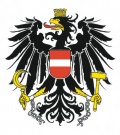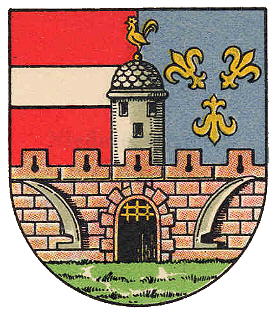Hainfeld (Niederösterreich): Difference between revisions
Knorrepoes (talk | contribs) m (Text replacement - "/Arms of " to "/Arms (crest) of ") |
Knorrepoes (talk | contribs) m (Text replacement - "{| class="wikitable"↵|+Official blazon↵|-↵|'''German'''↵| blazon wanted !↵|-↵|'''English''' ↵| ↵|}" to "{| class="wikitable" |+Official blazon |- |'''German''' | blazon wanted |- |'''English''' | blazon wanted |}") |
||
| Line 12: | Line 12: | ||
|- | |- | ||
|'''German''' | |'''German''' | ||
| blazon wanted | | blazon wanted | ||
|- | |- | ||
|'''English''' | |'''English''' | ||
| | | blazon wanted | ||
|} | |} | ||
Revision as of 10:14, 1 August 2023
Austria heraldry portal
This page is part of the Austria heraldry portal |
Heraldry of the World |
|
Civic heraldry:
|
Other heraldry: |
HAINFELD
State : Niederösterreich
District : Lilienfeld
| German | blazon wanted |
| English | blazon wanted |
Origin/meaning
The arms were granted on January 2, 1583 and again in 1965.
The arms show a city gate as symbol for the city itself. The rooster on the tower symbolises vigilance. The silver bar in red shows the arms of Austria. The fleur-de-lys are taken as canting elements from the arms of the Lilienfeld Convent. The convent acquired the jurisdiction over the village in 1369 from Duke Albrecht III of Austria.
The two scythes symbolise the importance of the metal industry, especially scythes, for the city at the time.
Contact and Support
Partners:
Your logo here ?
Contact us
© since 1995, Heraldry of the World, Ralf Hartemink 
Index of the site
Literature : Image from the Coffee Hag album +/- 1932; Ströhl, 1904












